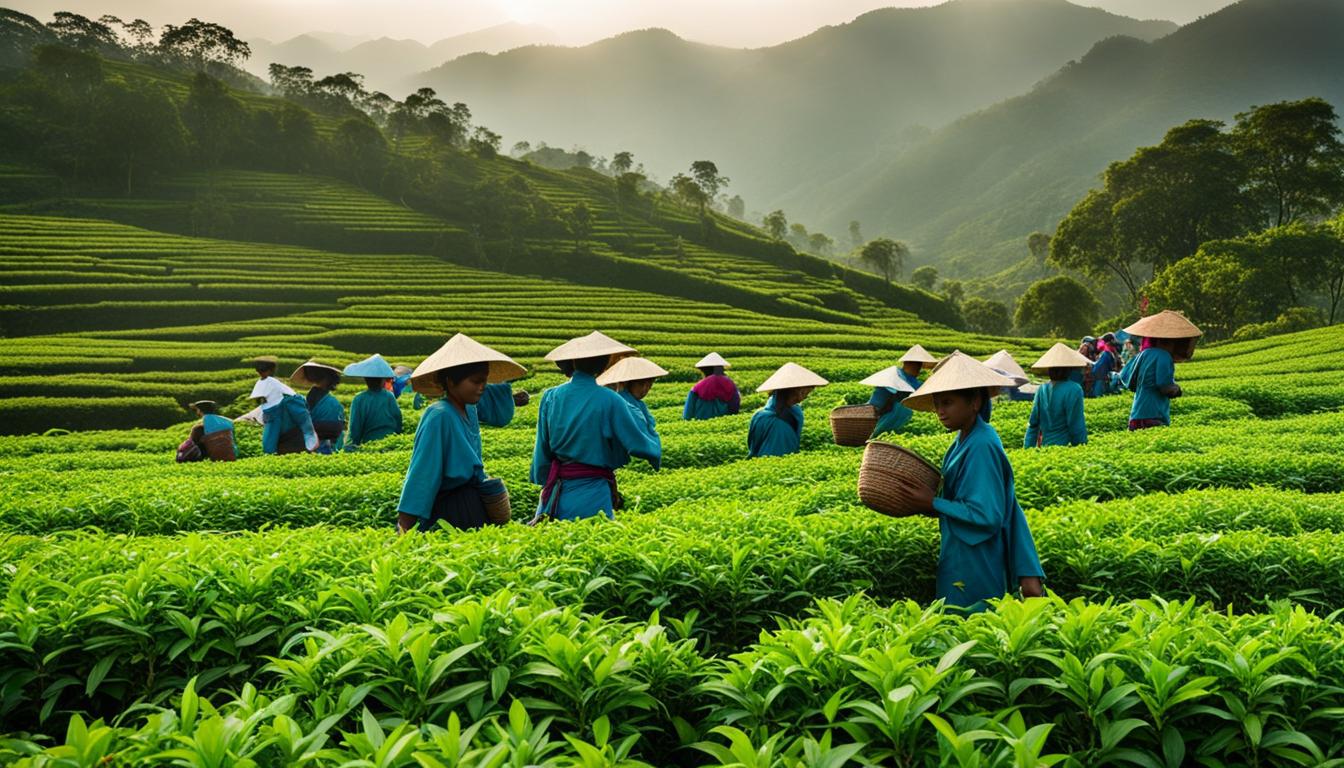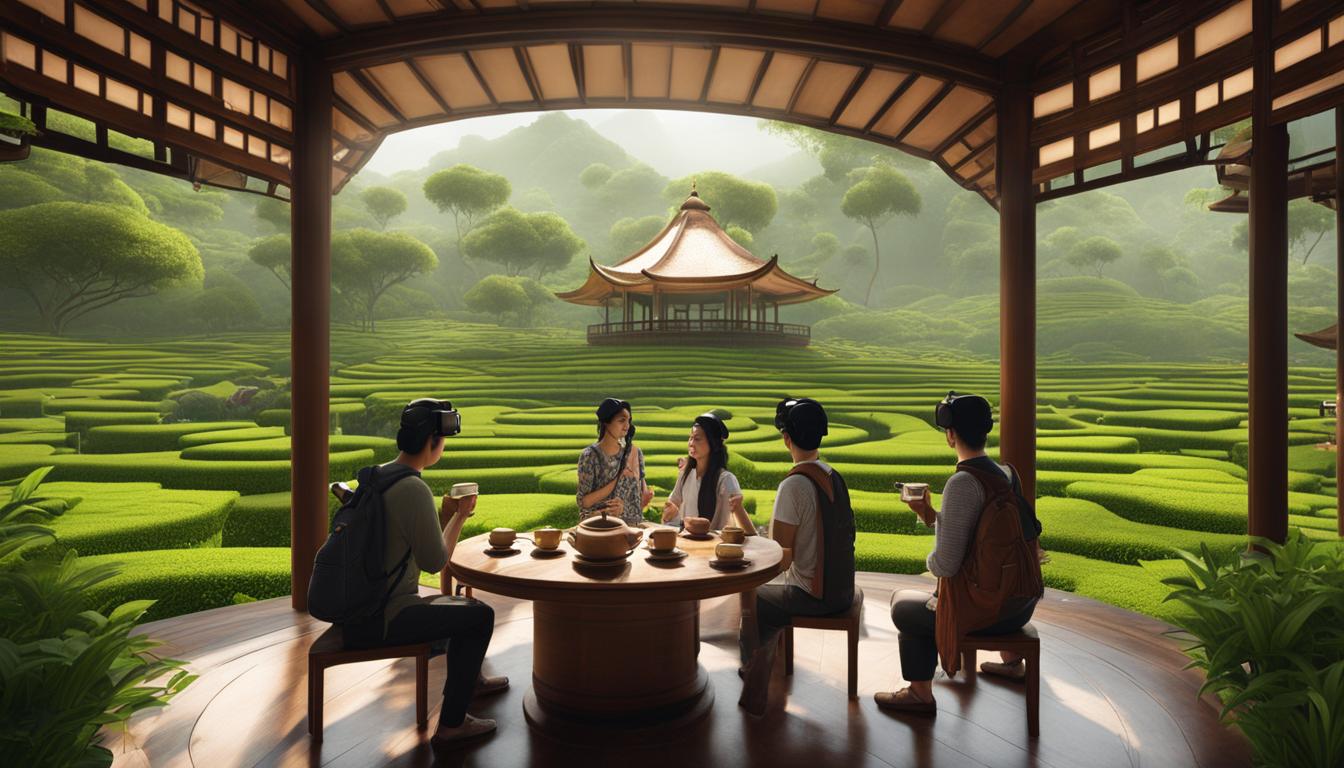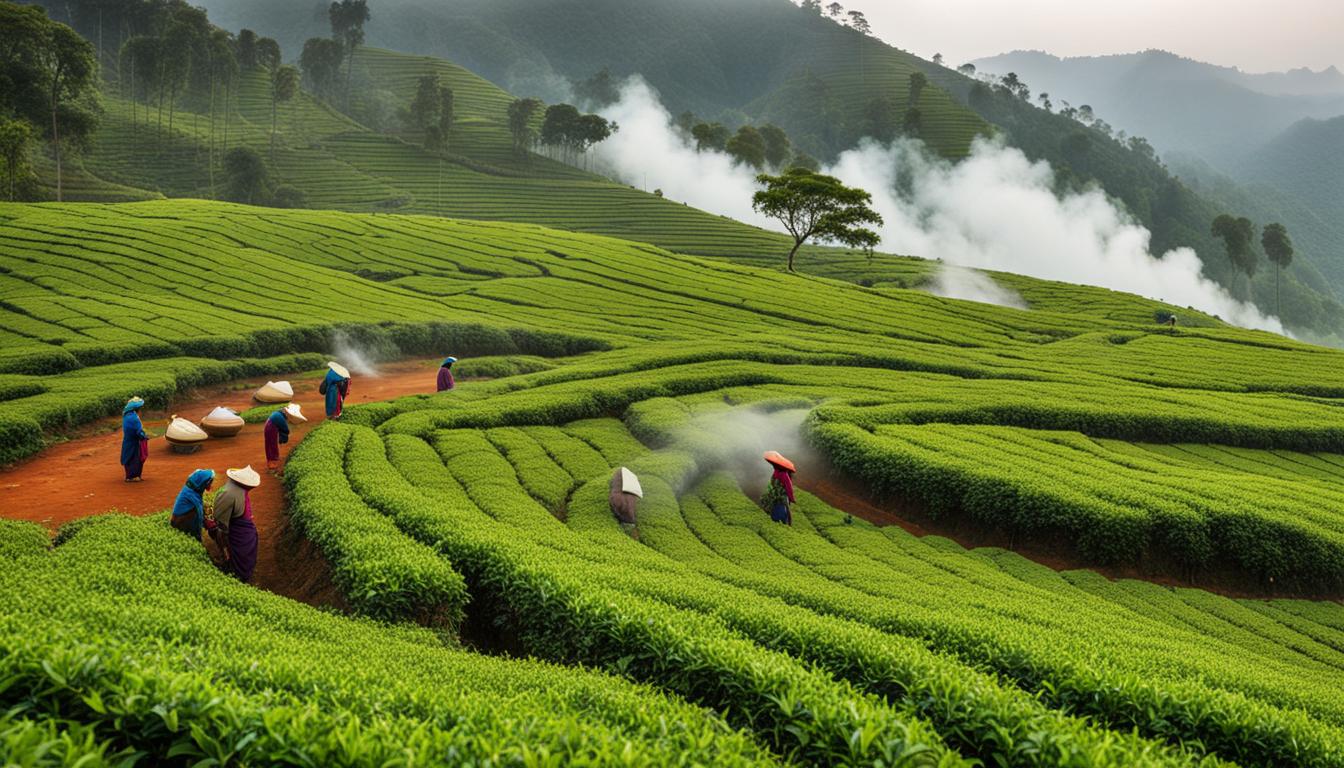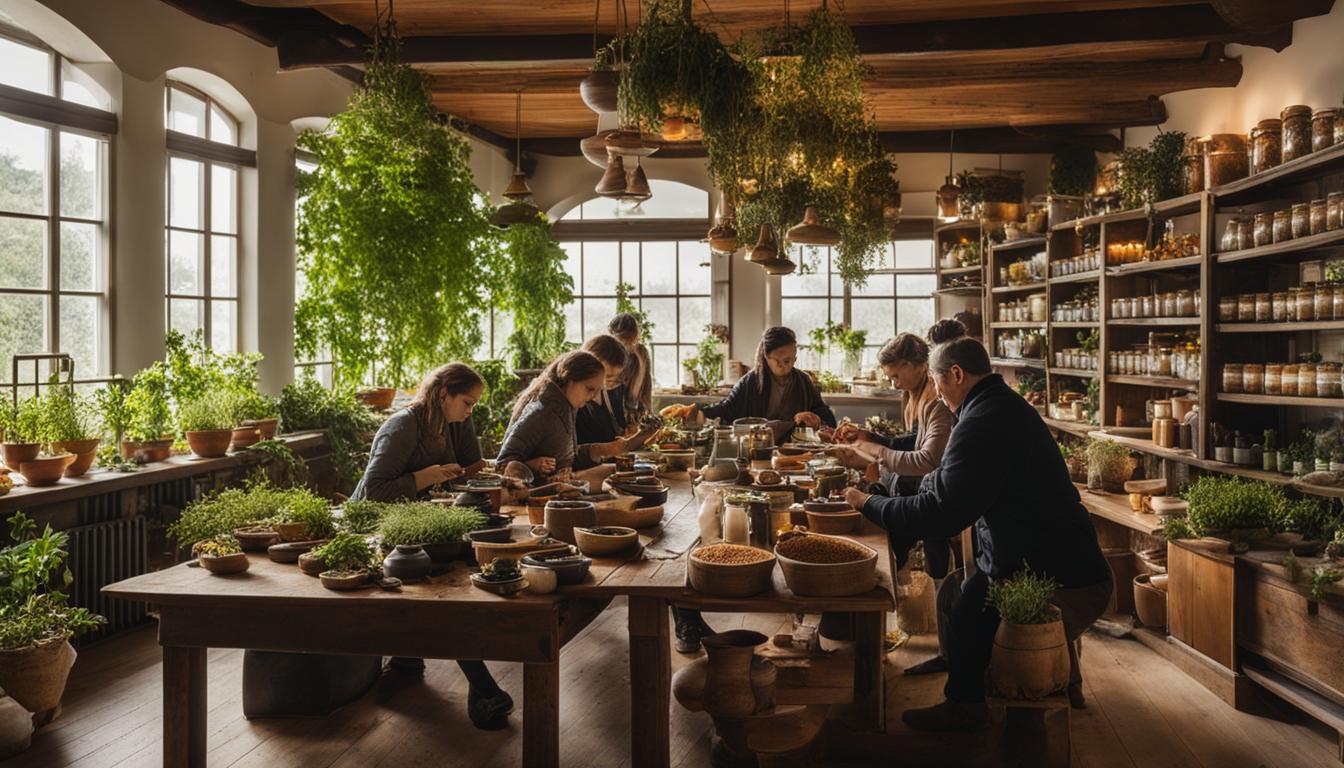Welcome to our exciting exploration of tea estate visits! In this article, we will embark on a journey of educational experiences, where students and tea enthusiasts alike can immerse themselves in the fascinating world of tea production. From the lush tea gardens of Assam to the captivating plantations in Rwanda and the breathtaking mountains of Nepal, we will discover the rich heritage, cultural significance, and sustainable practices of tea estates around the world.
Key Takeaways:
- Educational tea estate visits offer valuable insights into the art of tea production
- Tea plantation learning experiences provide a unique blend of history, agriculture, and cultural immersion
- Tea estate trips offer opportunities for students to explore the journey of tea from leaf to cup
- Learning about tea production tours enhance understanding of tea culture and sustainable farming practices
- Tea estate visits support local economies and celebrate the cultural significance of tea production
Exploring Rwanda’s Captivating Tea Plantations
Rwanda, known for its breathtaking landscapes, is home to captivating tea plantations that attract tourists from all over the world. With fertile volcanic soil and favorable climatic conditions, Rwanda has become a significant player in the global tea industry. The tea plantations offer visitors a chance to witness the entire process of tea production, from cultivation to processing. The natural beauty of Rwanda’s tea plantations, set amidst cascading slopes, provides a picturesque backdrop for exploration.
The tea tours in Rwanda not only offer a visually stunning experience but also provide an educational opportunity to learn about the art of tea production and Rwanda’s rich history and culture. The must-visit tea estates near Nyungwe Forest National Park, such as Gisakura Tea Estate, Gisovu Tea Estate, and Gatare Tea Estate, showcase the harmonious coexistence of cultivated tea and untouched wilderness. These estates offer guided tours, tea making workshops, and an opportunity to explore the local cuisines. By visiting these tea plantations, tourists not only support the local economy but also gain a deeper appreciation for the economic significance of tea production in Rwanda.
“Rwanda’s tea plantations offer a unique blend of natural beauty, cultural immersion, and tea exploration. The experience of witnessing the tea production process and interacting with local communities provides visitors with a deeper understanding of Rwanda’s rich heritage. It’s truly a journey that engages all the senses, from the stunning vistas to the aroma of freshly brewed tea.”
To fully appreciate the beauty and significance of Rwanda’s tea plantations, a visit to Nyungwe Forest National Park is a must. This lush rainforest is not only a haven for biodiversity but also home to Gisakura Tea Estate. The estate showcases an exquisite balance between tea cultivation and preserving the natural environment. From guided tours to tea tasting sessions, visitors can immerse themselves in the world of Rwandan tea production. The experience is further enhanced by the opportunity to explore the surrounding area, with its diverse wildlife and captivating landscapes.
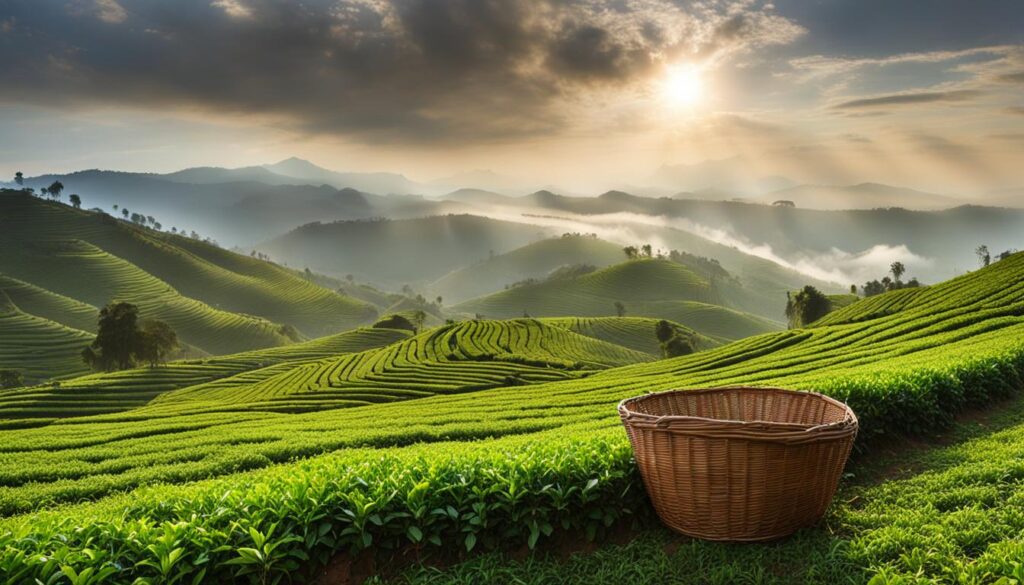
| Tea Estate | Location | Highlights |
|---|---|---|
| Gisakura Tea Estate | Nyungwe Forest National Park | Guided tours, tea tasting sessions, stunning natural surroundings |
| Gisovu Tea Estate | Rutsiro District | Visits to the tea fields, tea processing demonstrations |
| Gatare Tea Estate | Nyaruguru District | Tea factory tour, tea tasting, scenic views of the surrounding hills |
A visit to Rwanda’s tea plantations is not only an opportunity to indulge in the beauty of the landscape but also to support sustainable tea production. The tea industry in Rwanda plays a vital role in the country’s economy, providing employment and contributing to rural development. By choosing to explore these tea estates, visitors actively contribute to the preservation of Rwanda’s natural heritage and the well-being of local communities.
An Immersive Holiday in Nepal’s Tea Mountains
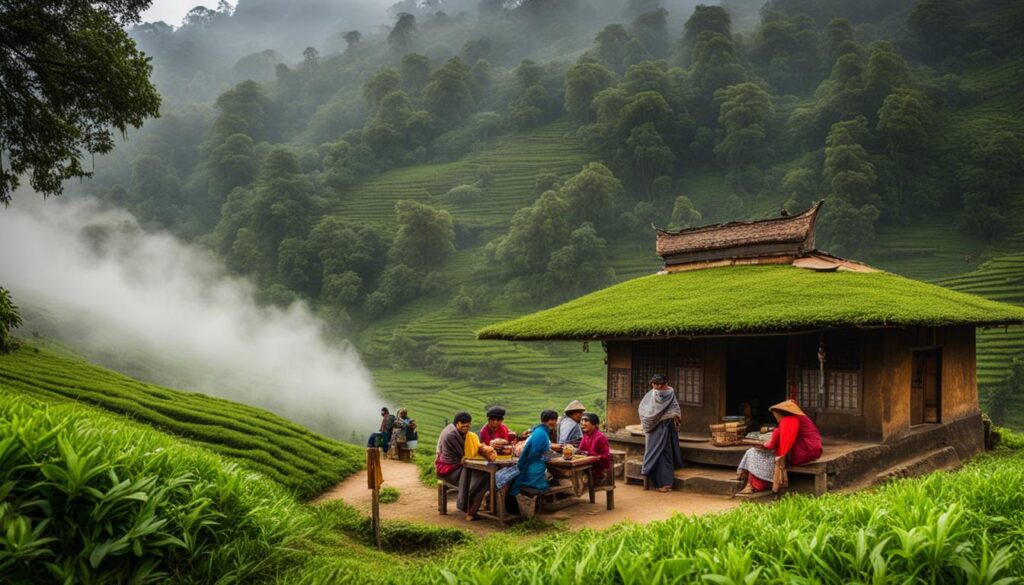
Nepal, known for its breathtaking Himalayan mountains and rich cultural heritage, offers an immersive tea tourism experience like no other. Nestled in the picturesque tea gardens, visitors can explore the beauty of nature, learn about Nepali tea production, indulge in local cuisines, and immerse themselves in the traditions of the indigenous communities. The Nepal Tea Collective, a renowned organization dedicated to promoting sustainable tea tourism, offers guided tours that provide a unique blend of education, cultural exchange, and natural exploration.
During a visit to Nepal’s tea mountains, visitors have the opportunity to stay on the lush tea farms and experience the daily life of tea workers. They can participate in Nepali tea making workshops, where they learn the art of plucking tea leaves, processing them, and crafting their own teas. These workshops provide a hands-on experience that helps visitors understand the intricate process of tea production and the dedication of the tea farmers.
Furthermore, tea tourism in Nepal is not just about tea. It is a holistic experience that offers a glimpse into the vibrant Nepali culture and traditions. Visitors can savor the flavors of local Nepali cuisines, prepared with fresh ingredients and traditional cooking methods. They can also engage with indigenous healers, who carry forward ancient healing practices and offer insights into Nepali spirituality and well-being.
Table: Highlights of Nepal’s Tea Tourism
| Experience | Benefits |
|---|---|
| Stay on lush tea farms | Immerse in the tea-making process |
| Participate in tea making workshops | Learn about Nepali tea production |
| Indulge in local Nepali cuisines | Discover the flavors of Nepal |
| Engage with indigenous healers | Experience traditional Nepali practices |
“Nepal’s tea mountains offer a unique blend of natural beauty, cultural immersion, and tea exploration. It’s a journey that leaves a lasting impression on the senses and the soul.”
A trip to Nepal’s tea mountains is not just a holiday; it’s an opportunity to connect with nature, learn about tea production, and experience the rich culture of Nepal. Whether it’s strolling through tea gardens, tasting the aroma of freshly brewed tea, or embracing the warm hospitality of the local communities, Nepal’s tea tourism offers an experience that is both enlightening and enchanting.
Tips for Planning Your Educational Tea Estate Visit
Planning an educational tea estate visit can be an exciting and enriching experience for students and tea enthusiasts. Here are some essential tips to ensure a successful and enjoyable trip:
1. Determine the Best Time to Visit:
Consider the tea harvesting season and the weather conditions when selecting the optimal time for your visit. Summer months are often ideal, as tea gardens are bustling with activity during this time. This allows visitors to witness the entire tea production process, from plucking the leaves to processing them.
2. Organize Logistics in Advance:
Arrange transportation and accommodations well in advance to ensure a smooth trip. If guided tours are available, make sure to include them in your itinerary. Guided tours provide valuable insights into the tea-making process and allow you to learn from tea experts. They can also provide a deeper understanding of the cultural significance of tea production.
3. Experience Tea Tasting:
No tea estate visit is complete without indulging in tea tasting experiences. Sampling different tea varieties allows you to appreciate the distinct flavors and aromas of each type. This enhances your understanding of tea culture and helps you develop a discerning palate.
4. Embrace Sustainable Tea Tourism:
Support sustainable and ethical tea tourism practices by choosing tea estates that prioritize environmental conservation and fair trade. By doing so, you contribute to the local economy and minimize the negative impact on the environment.
By following these tips, you can ensure an educational tea estate visit that is both informative and enjoyable. From understanding the tea production process to experiencing the flavors of different teas, these visits offer a unique opportunity to immerse yourself in the world of tea.
| Table: Tea Estate Visit Checklist |
|---|
| Research the tea estate and its history |
| Check the tea harvesting season and weather conditions |
| Book transportation and accommodations |
| Include guided tours in your itinerary |
| Participate in tea tasting experiences |
| Support sustainable tea tourism practices |
Conclusion
As we conclude our exploration of educational tea estate visits, we cannot emphasize enough the importance of these experiences as valuable learning opportunities. Embarking on a tea tourism journey allows us to immerse ourselves in the cultural significance of tea production while gaining a deeper understanding of its rich history and traditions.
Tea tourism offers more than just a chance to witness the tea-making process; it provides a holistic learning experience. From the moment we set foot in Assam’s lush tea gardens to the breathtaking landscapes of Rwanda’s plantations and the immersive tea tours in Nepal’s mountains, we discover the intricate connection between tea and the communities that cultivate it.
By engaging in these educational visits, we not only support the local economies but also contribute to the preservation and celebration of tea culture. The journey from tea leaf to cup becomes more meaningful as we appreciate the artistry, craftsmanship, and sustainability practices involved in tea production. Each sip becomes a testament to the hard work and dedication of those who make tea a beloved beverage worldwide.
Tea tourism is truly a learning experience like no other. So why not embark on your own tea adventure and discover the cultural significance of tea production? Whether you’re a student eager to delve into the world of agriculture or a tea enthusiast seeking a deeper connection with your favorite beverage, educational tea estate visits promise to ignite your curiosity and leave you with a newfound appreciation for the journey of tea.
FAQ
What is the historical importance of Assam’s tea gardens?
Assam’s tea gardens have a rich history dating back to the early 19th century, with the first tea gardens established in the region. The discovery of indigenous tea plants and the establishment of tea estates in Assam have played a significant role in the global tea industry.
What contributes to the distinctive flavor of Assam teas?
The terroir of Assam, characterized by its unique geography, climate, and soil, contributes to the distinctive flavor of Assam teas. The hand-picking and year-round plucking of tea leaves also play a crucial role in the production process.
What are some must-visit tea estates in Assam?
Some must-visit tea estates in Assam include Mangalam Tea Estate and Halmari Tea Estate. These tea gardens provide visitors with an immersive and educational tour, showcasing the heritage, traditions, and eco-friendly initiatives of Assam’s tea industry.
What are the key attractions of tea plantations in Rwanda?
The tea plantations in Rwanda offer breathtaking landscapes and provide a picturesque backdrop for exploration. The must-visit tea estates near Nyungwe Forest National Park, such as Gisakura Tea Estate, Gisovu Tea Estate, and Gatare Tea Estate, offer guided tours, tea making workshops, and an opportunity to explore local cuisines.
What does tea tourism in Nepal offer?
Tea tourism in Nepal offers an immersive experience that includes living on lush tea gardens, participating in tea making workshops, exploring local cuisines, and discovering authentic Nepali traditions. Visitors can also encounter indigenous healers and customize their trip to include music, arts, and sports.
What should be considered when planning an educational tea estate visit?
When planning an educational tea estate visit, it’s important to consider the best time to visit, arrange logistics such as transportation and accommodations, include guided tours and tea tasting experiences, and prioritize sustainable tea tourism practices to support the local economy and minimize environmental impact.

